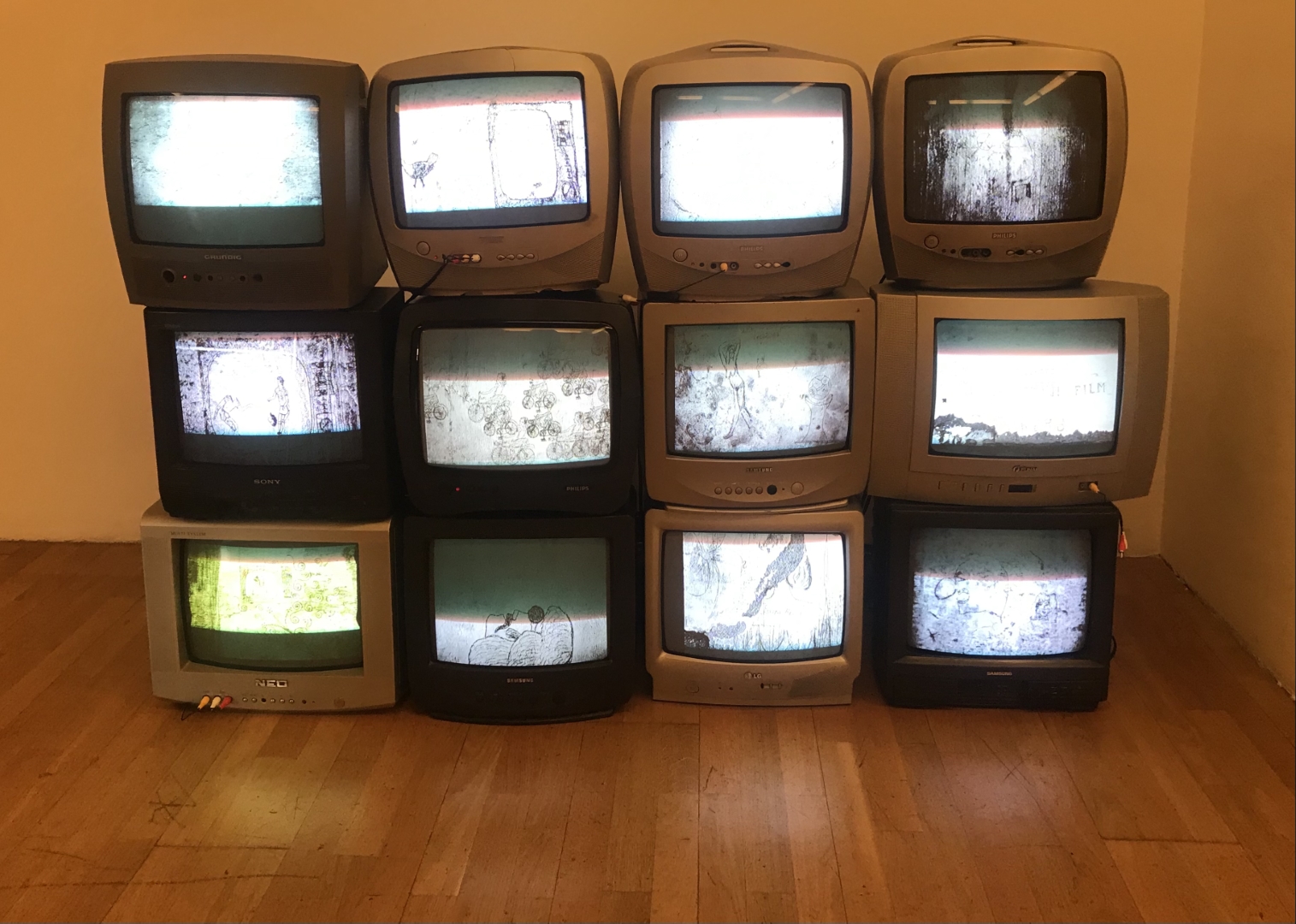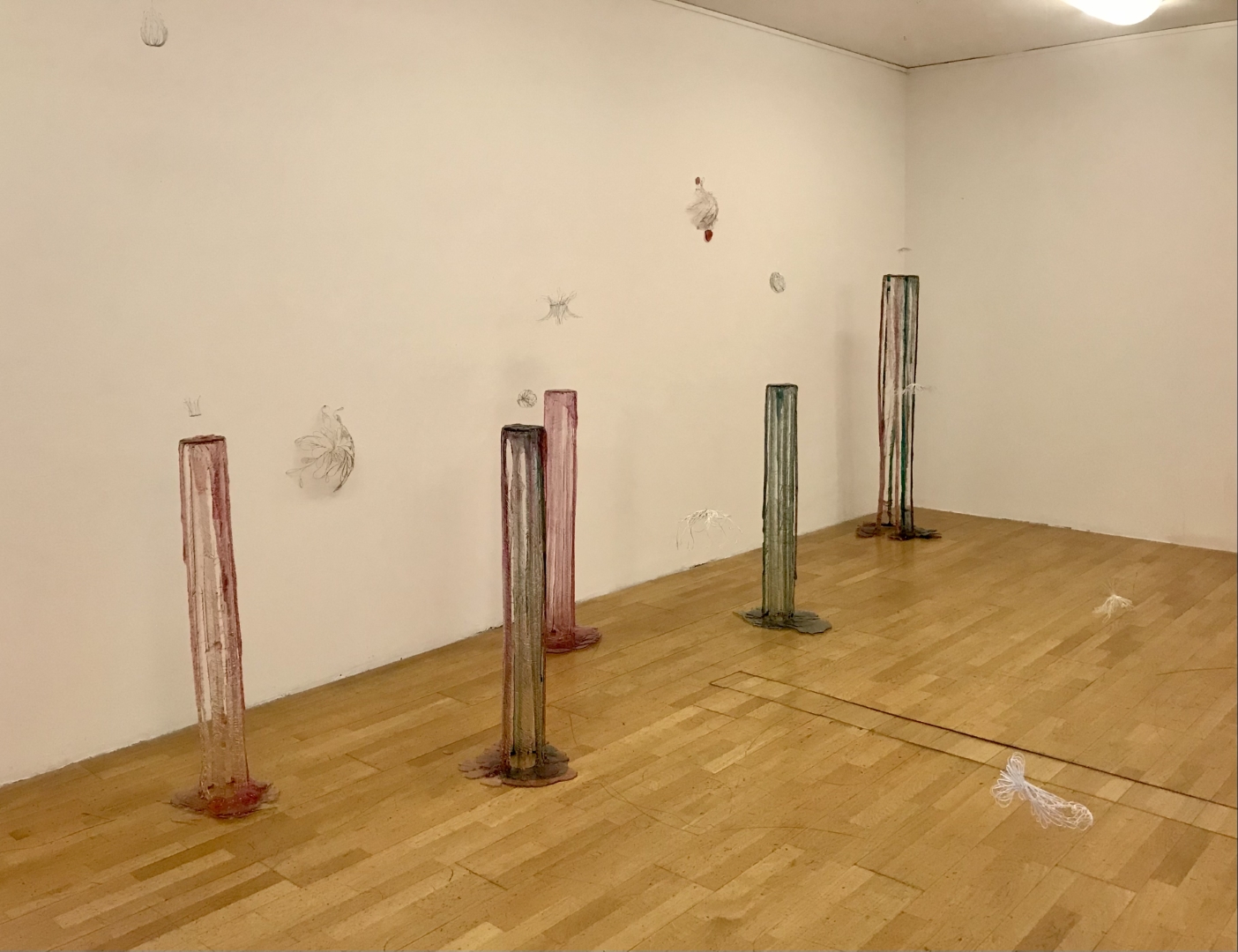Zeta Gallery presented the 13th edition of the “Ardhje” award for young artists up to the age of 35. This exhibition was open during the period of September 14 – 24, 2021, with the participation of the following artists: Abi Shehu, Matilda Odobashi, Sead Kazanxhiu and Fatlum Doçi. This year’s jury members were: Lilia Kudelia, Markus Waitschacher, Olson Lamaj. The winner of this year’s “Ardhje” award is Fatlum Doçi, whose work is an installation entitled Flowers and Tears. This award includes a two month experience in the residency program at Residency Unlimited, New York, which will take place during 2022. This exhibition was curated by Alban Hajdinaj.

Abi Shehu presented a video installation entitled Sahara, which consists of twelve old television sets, stacked on top of each other in three rows. Each screen displayed some animations extracted from the photographed images of some graffiti engraved on the walls of Spaç, the infamous former prison and labor camp (1968 – 1990). Abi Shehu introduced these images as an integral part of the building, where they seem realized as small pieces of archeological images. They remain as an evidence of the history of this building and the existence of the people who suffered their sentence within its walls.
Matilda Odobashi presented her project False Lines, realized on wallpaper with the dimensions 190×270 cm. This work is a mural that occupies a big surface on the wall on the left, at the entrance of the gallery. Her work consists of small drawings that are mostly sketches related to the impressions that the city and the urban situations left on the artist. Then the drawings move on to the process of digitalization. Initially, they are photographed and then processed on the computer, multiplying and repeating the elements of this composition.
Sead Kazanxhiu presents his work Muddling, a color video (8’22”) which shows three elderly Roma women accompanied by a little girl, who leave their house one morning to go and collect soil in a natural terrain. The film shows their actions in detail starting from the process of soil collection, the way back home, the processing of the collected material, and then the processing of the soil into a thin viscous mass of dark color. The camera focuses on the hands of the women who paint different objects with mud, while in a wider angle we notice the body of the artist who was also covered in mud. This whole situation happens in an office. This layer of mud that covers everything serves as a dividing line between the two worlds. The work seeks to unravel the relationship between Kazanxhiu as an artist and as an official on a government organization board, dealing with the rights of the Roma community, where he has been working for some time.
Fatlum Doçi presents his installation Flowers and Tears, made of different materials. This work consists of a series of objects or sculptures created by the artist with materials that are usually used in producing jewelry or decorative elements. These elements created by the artist in the form of stylized objects with almost floral motifs, occupy a large part of the gallery space, where they stand as a single work. The materials that are mainly used by artisans such as: silver, copper, natural stones, resin, etc., are brought differently by the artist through this work, in shapes that are liberated from their usual function. The artist is familiar with crafting and applies it in his daily activity. Fatlum Doçi’s work restores the old debate on art and craft, where the latter has turned out to be something that drew art back in time. Today its application is formalized and widely accepted.
The “Ardhje” Award 2021, is supported by the Ministry of Culture of Albania, The Trust for Mutual Understanding, Residency Unlimited and Young Visual Artists Awards.
Matilda Odobashi was born in Tirana in 1988. She studied at the University of Arts in Tirana (2006 – 2010), where she lives and works. Since 2012 she is a member of the Lacan Circle in Tirana. She worked as a adjunct professor at the University of Arts (2012 – 2015). Odobashi’s works have been exhibited in galleries and museums, both inside and outside the country.
Sead Kazanxhiu was born in 1987 in Fier, he lives and works in Tirana since 2012. Kazanxhiu’s family comes from the Roma ethnic minority, something that shaped his childhood years in Baltez, a village near Fier. He graduated from the University of Arts in Tirana (2006 – 2010). Since 2012 he has opened eight solo exhibitions in Tirana, Budapest and Brussels. He has also participated in numerous joint exhibitions in Tirana and in various European countries.
Abi Shehu was born in Lezha in 1993. She studied photography in the European University of Applied Sciences (BTK) in Berlin. She is currently living and working between Albania and Germany. Her works have been exposed in various exhibitions both inside and outside the country.
Fatlum Doçi was born in Shkodra in 1991. He studied at the University of Arts in Tirana (2010–2015), currently lives and works in Shkodra. He experiments in various mediums such as painting, drawing, sculpture, video, installations and jewelry. Fatlum Doçi’s works have been exhibited in various galleries in Europe. The artist has also held several solo exhibitions.



